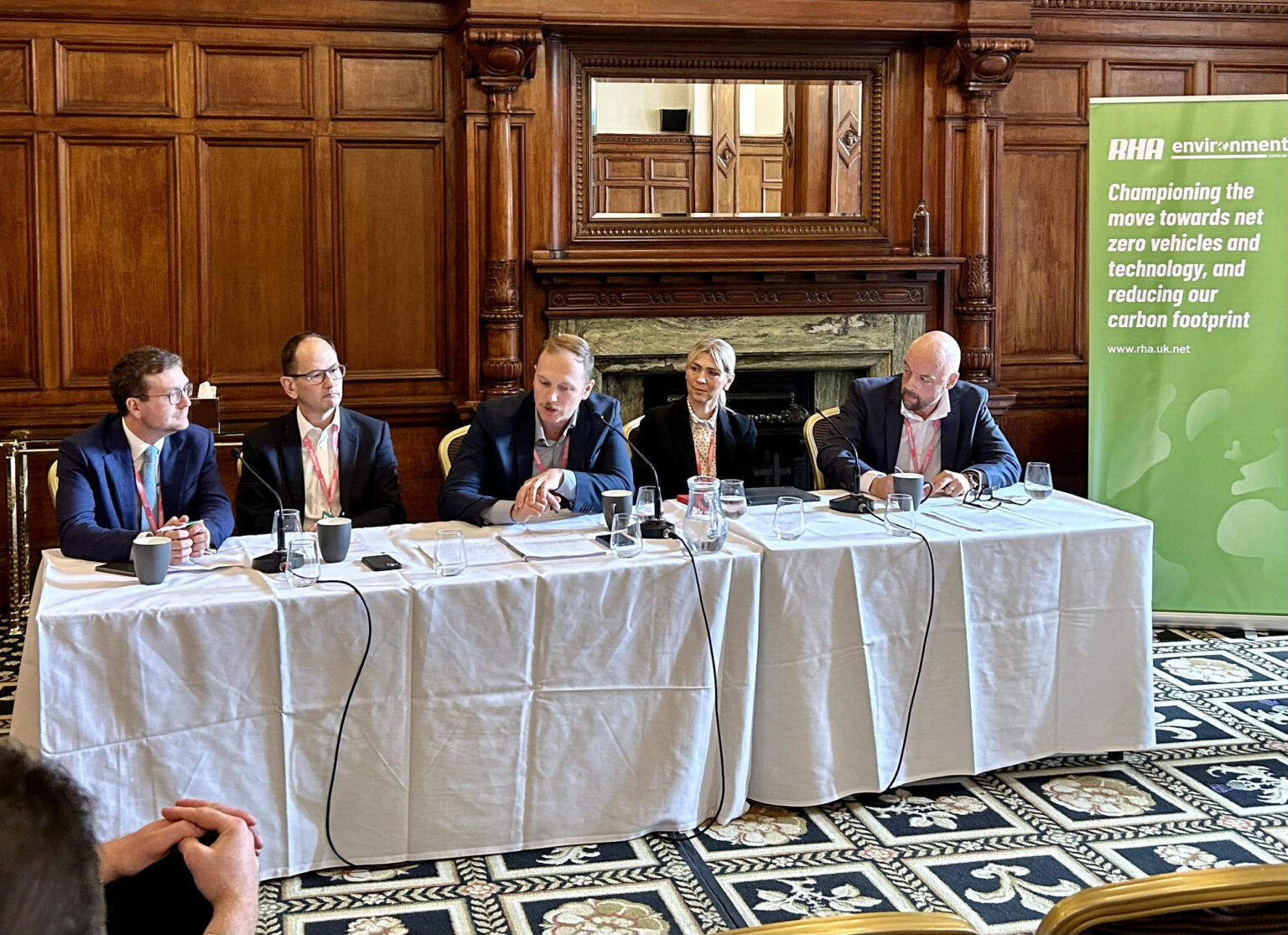MANCHESTER – The Conservative chair of a parliamentary group on hydrogen has defended the body’s receipt of £70,000 in funding from fossil fuel giants including Shell and Equinor.
Alexander Stafford, a former Shell employee and chair of the All Party Parliamentary Group (APPG) on Hydrogen, was speaking today on a panel about heavy goods vehicles (HGVs) and net zero at Conservative Party conference in Manchester.
Stafford, who is the Conservative MP for Rother Valley, said that his interest in hydrogen directly stems from his time working for Shell.
“To be honest with you, I probably wouldn’t be involved in hydrogen if I hadn’t worked for Shell before, because I’ve seen first-hand the need for hydrogen in vehicles,” he said.
He added that “hydrogen is really the only net zero game in town” for HGVs, since introducing electric models is “not going to happen at any scale or size” by 2040 or even 2050.
The Hydrogen APPG received more than £70,000 in February from Connect, a PR firm that is funded by oil and gas companies to run the parliamentary group. The companies include Shell, Cadent and Equinor.
When asked about this by DeSmog, Stafford – who worked for Shell prior to becoming an MP in 2019 – defended the oil and gas funding for the hydrogen APPG, which, like other APPGs, is set up to lobby on specific policy areas.
“On the funding element, all party parliamentary groups are funded by lots of different sources. There’s no influence over what we look at, what we do,” he said.
He added: “[Firms] like Shell, BP, fossil fuel companies, they’ve got money. They’ve got big money. They’ve got great scientists working for them. They’ve got some of the biggest and brightest minds in the world developing those low carbon solutions.
“Either we can go away and live in a cave and tackle net zero that way, or we can embrace the companies that have the technology and science to actually get us there.”
(Although listed by Stafford in the meeting, BP is not publicly listed among the APPG’s funders).
False Solutions
Experts have warned that exaggerating the potential of hydrogen could delay action on tackling climate change by obstructing the rollout of renewables and keeping the fossil fuel industry alive.
Matt Finch, UK Policy Director at the Transport and Environment campaign group, speaking to DeSmog in Manchester after the panel event, said: “For the gas companies, the transition to net zero is existential. They are pushing for as much blue hydrogen as possible, to ensure they can use some of their assets for decades longer. Using methane – [to make] blue hydrogen – always results in some residual emissions. Green hydrogen, produced using electricity is the only zero carbon option.“
Producing “green“ hydrogen, which involves using electrolysis powered by solar and wind to split water and create the final product, is widely seen as an important way to decarbonise industrial processes where it is hard to avoid greenhouse gas emissions. However, it is more scarce, expensive and energy intensive than other forms of hydrogen. As a result, ‘grey’ fossil-based hydrogen (made with natural gas or coal) makes up 96 percent of existing supplies globally.
Finch also said Stafford was wrong about hydrogen being a better way to decarbonise HGVs than electricity. He said “there are already electric HGVs on the roads” in small numbers, adding that “most manufacturers have plans to bring new electric models to market in the next couple of years.
“There is effectively no low-carbon hydrogen supply currently, no hydrogen refuelling infrastructure, and no mass-market hydrogen HGVs on the market.”
Finch also pointed out that “there are other sectors that will need hydrogen to decarbonise, that don’t have an alternative” like electricity, as transport does.
Stafford sits on a number of APPGs, including the groups on Net Zero, Climate Change, and the Environment.
He also spoke on a Conservative conference panel event, titled “Facing the Future Together: The Road Ahead to Net Zero”, which was run by the Road Haulage Association (RHA), and chaired by Alex Simakov, a senior research fellow at the conservative think tank Policy Exchange.
As DeSmog has reported, Policy Exchange received $30,000 from oil corporation ExxonMobil in 2017. In June, Prime Minister Rishi Sunak credited the group’s work with helping shape the government’s crackdown on climate protests.
Stafford was speaking alongside Richard Smith, managing director of the Road Haulage Association (RHA), who said the road haulage industry was committed to decarbonisation and net zero, and said this could be achieved using different kinds of fuels.
When asked about internal combustion engines, he said “our position is we see the combustion engine around for 20, 30, 40 years” and characterised expecting it to disappear as “foolish”.
The RHA has in the past funded the campaign group FairFuelUK, which lobbies for fuel duty cuts and has recently focussed on attacking the phaseout of petrol and diesel cars in favour of electric vehicles.
FairFuelUK director Howard Cox, who is running for London Mayor for Nigel Farage’s Reform UK party, has a long record of casting doubt on climate science, declaring in 2022: “I am now even more convinced man is not responsible for global warming.”
Last month Cox called net zero “economic suicide” and urged the governent to “scrap” it.
When asked by DeSmog about his group’s support for FairFuel UK, Smith said the RHA was not currently funding FairFuelUK, and that this funding stopped “12 months ago”.
Subscribe to our newsletter
Stay up to date with DeSmog news and alerts






